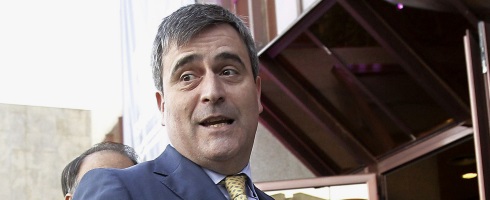The issue of how money from TV rights is distributed in La Liga has reared into view once again. However, this time it came with a difference, primarily an explicit threat from Espanyol’s President Joan Collet.
“We’re willing to bring La Liga to a halt through the LFP (Spanish football League) if a decree isn’t issued about the regularization of TV rights,” he said on Spanish radio station RAC1. “If they don’t get their act together, we’re willing to do it.”
It’s not surprising to see why Collet threatened strike action when looking at the situation. Spanish clubs negotiate TV deals individually through a broadcaster. This means a disparity in the amount of money generated from those contracts between elite clubs, such as Real Madrid and Barcelona, and the rest.
The figures speak for themselves. Last season Real Madrid and Barcelona reportedly received €140m each from their deals while League champions Atletico Madrid made just €42m. Five clubs – Almeria, Rayo Vallecano, Granada, Elche and relegated Real Valladolid pocketed a paltry €19m. The gulf between the highest and lowest earners is telling – a gap of €121m.
There was hope two years ago the issue of TV rights may have been addressed when legislation was proposed to fairly distribute €800m across Spanish football. 10% of the pot would go to Liga Adelante, Spain’s second tier, while the rest would be shared within La Liga, with no club earning more than 20% of the €720m remaining.
However, the proposed motion stalled with no progress made since the idea was first tabled. Last Friday, all of the clubs within the top two tiers of Spanish football [with the exception of Athletic Bilbao] signed a letter calling for Spain’s Secretary of State for Sport Miguel Cardenal [pictured above] to implement the legislation.
But what prompted Collet to make his outburst this week, seeing the motion was first tabled two years ago? Well, the recent announcement of a three-year TV deal commencing in 2016 struck by the Premier League and TV networks Sky and BT, worth £5bn, seems to have jolted Collet to action.
“Any team in the Premier League can sign your best player by doubling their salary,” he added on RAC1. “That's what's happening to us and it will keep happening if this situation isn't sorted out,”
The negotiation of TV rights is vastly different in England than Spain due to negotiations being done collectively, rather than individually. Earnings among mid-table sides in the Premier League would be higher than their counterparts in La Liga.
For example, Getafe, who finished 13th last season, received €25m from their TV rights deal during the 2013-14 campaign. Compare that to Crystal Palace, who finished 13th in the Premier League, receiving €98.6m: nearly triple the amount.
A fairer TV deal that benefits all 20 La Liga sides rather than an elite few is sorely needed. It will help even the playing field and boost more clubs financially – something that is bearing fruit in England but also the German Bundesliga.
It all depends whether those at the top will acquiesce to their demands. Football would be a better place if they do.

